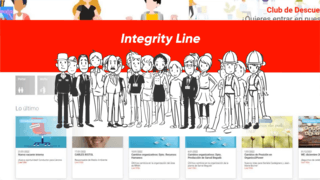Compliance & Tax Compliance
Compliance and integrity are fundamental elements of our business conduct. Continuously improving our compliance and tax compliance management systems, while closely monitoring changes in the legal environment, is a key element in ensuring legally compliant behaviour within our organization.

Our international compliance organization meets four times a year to ensure regular exchange and facilitate Group-wide collaboration.
Compliance
In 2022, we reached another milestone in the development of our compliance management by establishing our Group-wide policy on compliance reporting. It defines the contents that our regional compliance officers have to report to the Group Chief Compliance Officer and the local management regarding their respective area of responsibility. This allows us to quantify and better evaluate our overall and specific compliance performance.
The ability to act or react as soon as possible at a local and Group level depends on timely information. This is why our policy – in addition to an encompassing annual report – mandates quarterly reports that ensure a continuous information process. In addition, we provide a template that facilitates the submission of the necessary data for our regional compliance officers. Our Group Chief Compliance Officer in turn can rely on comparable and structured information, which eases its aggregation into our Group compliance report that is presented to the Executive and Supervisory Board of SARIA SE & Co. KG as well as SARIA Group’s Compliance Board. Overall, we can safely say that the reporting process further strengthens the communication and coordination process between the actors in our compliance organization.

Our Compliance Organization

Hand in hand with our compliance reporting policy, we also started the rollout of an encompassing process for compliance risk assessment in our entire organization in 2022. SARIA experts carry out systematic internal interviews in crucial areas such as corruption, conflict of interest, fraud, money laundering, competition and antitrust law. In Germany alone, more than 50 interviews were held last year to identify potential threats at an early stage, 20 more were completed in the first quarter of 2023. A similar process is conducted in all other countries as well. This allows active risk management and control, as our underlying aim is to predict and prevent risks instead of having to take corrective action at a later stage.
Another important element in our compliance management is our SARIA Code of Conduct, which contains norms and standards on issues that are fundamental for how we do business, such as fair competition, human and employee rights, data protection, but also environmental protection and the sustainable use of natural resources. Due to the dynamics that pertain to these issues, we constantly revise our code based on careful monitoring. In 2022, we made modifications to account for the requirements of the German Supply Chain Due Diligence Act (“Lieferkettensorgfaltspflichtengesetz”) that came into effect on 1 January 2023.
As part of our Group-wide compliance risk assessment, more than 70 interviews with people in critical functions were held in Germany alone.

Part of our extensive information campaign in Spain was a compliance explanatory video.
A vital instrument to strengthen adherence to our code is our whistleblowing system, which we further improved last year. We have added a FAQ section to our “Integrity Line” explaining how anonymity is guaranteed and how the information provided is processed. This aims to reduce insecurity on the part of employees or other potential whistleblowers and encourage them to use it when necessary. To make sure the FAQs are widely accessible, we currently provide them in 17 languages.
Promoting compliant behaviour and integrity is not possible without awareness and prior knowledge. Here, the major focus is at a local level to reach our people directly. In Spain, for example, the new code of conduct was distributed to all employees with an extensive information campaign comprising posters and an explanatory video sent through our email and intranet systems.
In the next step of our employee involvement process, we actively train our people so that they know how to apply rules, regulations and the instruments available to them. To ensure participation in our e-learning programs, one of the improvements in 2022 was that all employees in our German organization with a valid email address are now automatically registered for our courses on “Compliance Basics” and “Social Compliance”. To follow up, we also monitor if employees have taken the courses in due time.
The above measures illustrate how we continuously improve our compliance management system, aiming to make integrity an integral part of everything we do.
Tax Compliance
A changing legal environment has accelerated the development of our Group tax strategy. Against the background of global corporate tax reform and the effort to establish a global minimum effective tax (“Pillar 2”), we continuously deepen the transnational coordination of our tax strategy. We have identified tax obligations as one of our material risk areas, as we operate globally and are confronted with strongly differing tax regimes. Effective compliance ensures that we meet tax obligations in all jurisdictions where we do business.
In 2022, most of our units carried out tax risk assessments relating to their business activities. Based on the analysis, guidelines providing more details on how to ensure effective local tax compliance were developed. In 2023, the remaining units will formalize their local tax compliance management systems. To follow up, we will raise awareness among the relevant employees for the crucial importance of rigorous tax compliance throughout all units.


